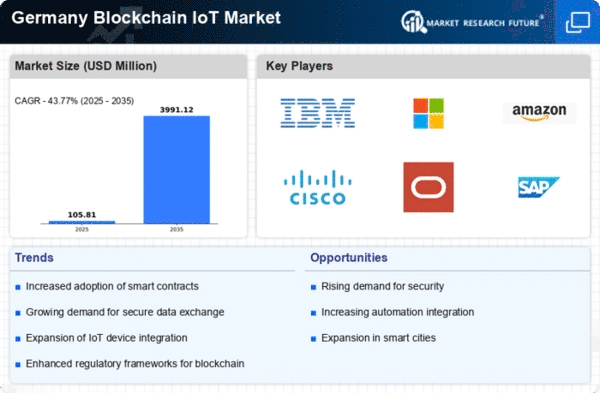Increased Focus on Data Privacy
Data privacy concerns are driving innovation in the blockchain iot market, especially in Germany, where stringent regulations like the GDPR are in place. Companies are increasingly seeking solutions that ensure data integrity while complying with privacy laws. The blockchain technology offers a decentralized approach to data management, which can enhance security and user control over personal information. In fact, a recent survey indicated that over 60% of German consumers are more likely to engage with companies that utilize blockchain for data protection. This growing emphasis on data privacy is likely to propel the blockchain iot market forward, as businesses strive to build trust with their customers and adhere to regulatory requirements.
Rising Adoption of Industry 4.0
The blockchain iot market is significantly influenced by the rising adoption of Industry 4.0 principles in Germany. As industries transition towards smart manufacturing and automation, the need for secure and efficient data exchange becomes paramount. Blockchain technology, combined with IoT, facilitates this by providing a secure framework for data sharing among machines and systems. In Germany, approximately 80% of manufacturers are expected to implement Industry 4.0 technologies by 2026, which will likely drive the demand for blockchain solutions. This integration not only enhances operational efficiency but also fosters innovation in product development and supply chain management. Consequently, the blockchain iot market is poised for substantial growth as industries embrace these advanced technologies.
Enhanced Supply Chain Transparency
The blockchain iot market is experiencing a surge in demand for enhanced supply chain transparency. In Germany, industries such as automotive and manufacturing are increasingly adopting blockchain technology to track products throughout their lifecycle. This technology allows for real-time monitoring and verification of goods, which can reduce fraud and improve accountability. According to recent studies, approximately 70% of German companies in these sectors are exploring blockchain solutions to enhance their supply chain operations. The integration of IoT devices with blockchain enables seamless data sharing, ensuring that all stakeholders have access to accurate information. This trend is likely to drive growth in the blockchain iot market as businesses seek to optimize their supply chains and improve customer trust.
Growing Demand for Smart Contracts
The blockchain iot market is witnessing a growing demand for smart contracts, particularly in Germany's financial and legal sectors. Smart contracts automate and enforce agreements without the need for intermediaries, which can significantly reduce transaction costs and time. In Germany, the adoption of smart contracts is projected to increase by over 50% in the next few years, as businesses recognize their potential to streamline operations. This trend is particularly relevant for industries such as real estate and insurance, where contract execution can be complex and time-consuming. The integration of IoT devices with smart contracts further enhances their functionality, allowing for automated responses based on real-time data. As a result, the blockchain iot market is likely to expand as more companies leverage this technology to improve efficiency and reduce operational risks.
Support from Government Initiatives
Government initiatives in Germany are playing a crucial role in shaping the blockchain iot market. The German government has been actively promoting the adoption of blockchain technology through various funding programs and research initiatives. For instance, the Federal Ministry for Economic Affairs and Energy has allocated significant resources to support blockchain projects that enhance digital infrastructure. This support is expected to increase investment in the blockchain iot market, as companies seek to align with national strategies for digital transformation. Furthermore, the establishment of regulatory frameworks is likely to provide clarity and encourage innovation in the sector. As a result, the blockchain iot market is anticipated to benefit from these government-led initiatives, fostering a conducive environment for growth.
















